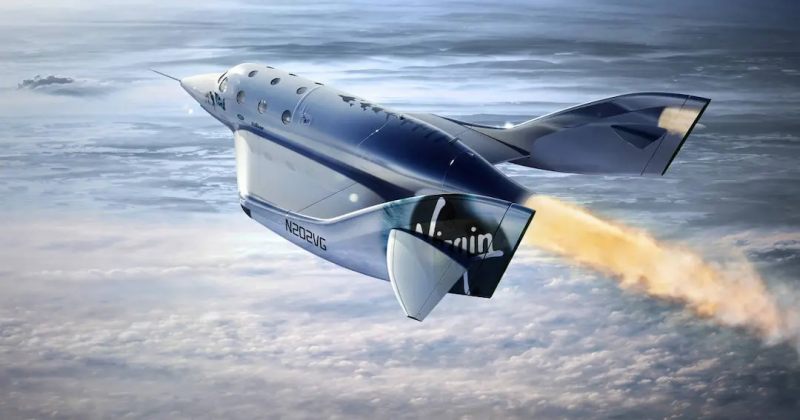On a clear Saturday morning, Virgin Galactic marked a significant milestone in the history of commercial space travel. The company's VSS Unity spaceplane, carrying a crew of four, completed its final flight before a planned operational pause. This hiatus is earmarked for a comprehensive upgrade of the fleet, signalling Virgin Galactic's commitment to enhancing safety, performance, and customer experience.

Image by Virgin Galactic
The mission, dubbed "Galactic07," saw the spaceplane take off from Spaceport America in New Mexico, nestled securely under the wings of its carrier aircraft. At precisely 8:31 am Mountain Time, the carrier plane ascended to an altitude of 44,500 feet over the course of 50 minutes. It was at this point that VSS Unity was released, igniting its rocket engines to propel itself to the edge of space at supersonic speeds, achieving Mach 2.96—nearly three times the speed of sound.
The crew, comprising two pilots and two passengers, experienced several minutes of weightlessness, a surreal moment that allowed them to witness the curvature of the Earth—a view that few have had the privilege to see. Among the passengers was Tuva Atasever, a Turkish astronaut representing her nation's space agency, whose participation was facilitated by Axiom Space. Joining her were Anand "Andy" Harish Sadhwani, a SpaceX propulsion engineer; Irving Izchak Pergament, a New York real estate developer and pilot; and Giorgio Manenti, an Italian investment advisor.
During the flight, Atasever donned specialized headgear equipped with sensors to monitor brain activity, a dosimeter, and insulin pens. These instruments were part of a scientific endeavour to gather data on physiological responses in microgravity, with a particular focus on the administration
of insulin - a critical step towards ensuring the health and safety of diabetic astronauts.

Virgin Galactic’s VSS Unity. (Matt Hartman via AP, File)
This flight represented the seventh commercial venture for Virgin Galactic since its inception in 2004 by the visionary entrepreneur Richard Branson. It also marked the final journey for the VSS Unity, as the company prepares to introduce its next-generation "Delta class" spacecraft. These new ships, currently under construction in Arizona, promise to carry six passengers—two more than Unity—and are slated for test flights in 2025, with commercial operations commencing the following year.
The transition to the Delta class is more than an upgrade—it's a strategic move aimed at propelling Virgin Galactic into profitability. With the company experiencing financial turbulence, evidenced by significant losses and workforce reductions, the success of the Delta class is crucial. Virgin Galactic's stock has seen a dramatic decline, from a peak of $55 in 2021 to a mere 85 cents, underscoring the urgency of this endeavour.
The Delta class ships are poised to offer an enhanced experience at a ticket price of $600,000, with the company projecting up to 125 flights annually. This ambitious plan is not without its sceptics, as analysts caution investors about the potential for zero revenue during the upgrade period and the risks of unforeseen delays.
Meanwhile, Virgin Galactic's main competitor, Blue Origin, has resumed its crewed suborbital flights after a two-year break. However, a recent incident involving a malfunctioning parachute has cast a shadow over its operations, potentially affecting its upcoming missions.


Add comment
Comments